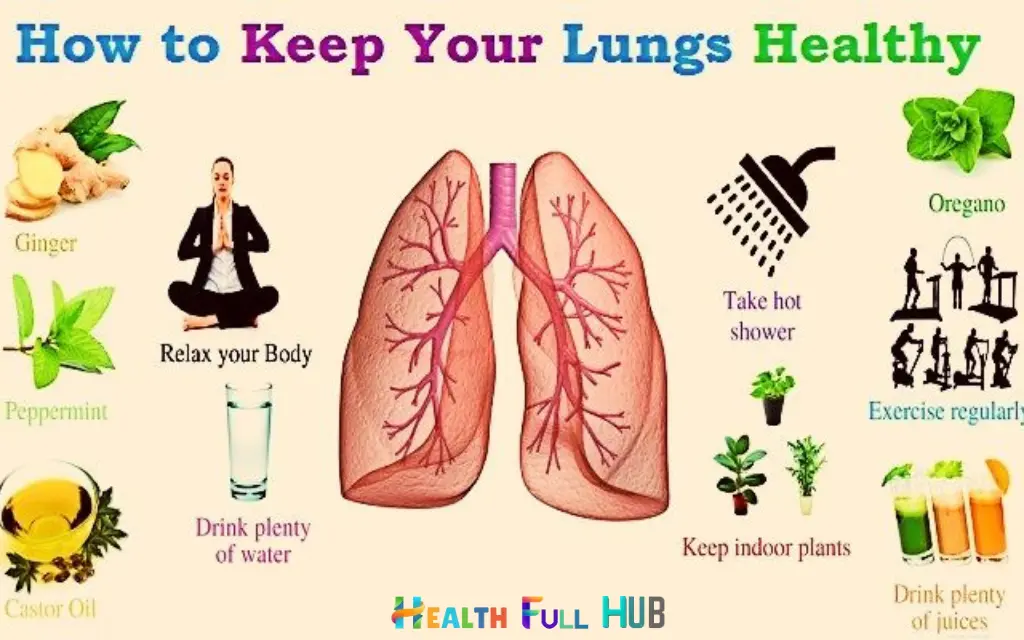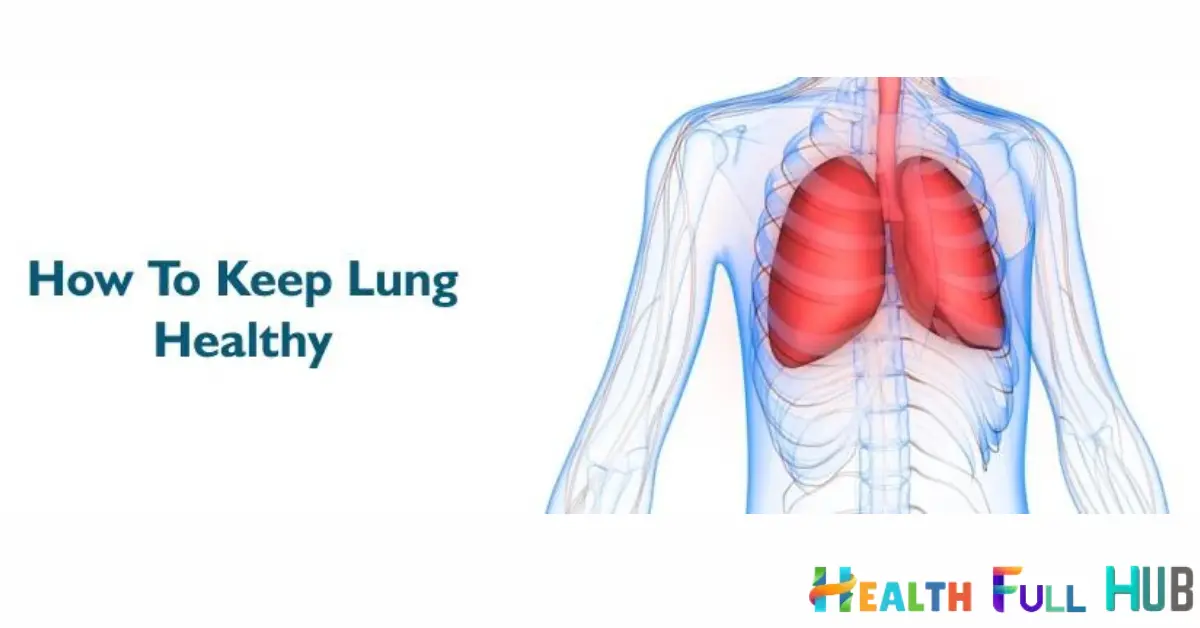introduction
Our bronchi play a critical role typical us awake and well, yet they frequently don’t endure the care they get. As a key organ in our respiring whole, the lungs guarantee that oxygen circulates all the time the crowd, enabling our containers to function efficiently. Keeping our lungs active is detracting for overall wellbeing, especially in spite of air abuse, smoking, and catching afflictions. This inclusive guide will explore direct habits to maintain body part strength, ensuring they stay powerful and flexible for age to come How to Keep Lungs Healthy.

Understanding the Importance of Lung Health
Our bronchi are unusual organs that work continuously to support all breath we take. Maintaining their strength is not only about halting diseases like incessant opposite pulmonary affliction (COPD) or lung malignancy but again about ensuring optimum oxygen exchange, that is critical for our material and insane well-being. Poor bronchi fitness can impact entirety from our stamina to our resistant whole’s ability contend off contaminations.
Quit Smoking and Avoid Secondhand Smoke
One of ultimate significant things we be able to maintain athletic lungs search out quit hot. Cigarette fume is loaded accompanying harmful chemical compound, containing tar, nicotine, and carbon monoxide, which seriously damage pleura tissues. Smoking is the leading cause of stoppable lung ailments, including bronchi malignancy and COPD.
- Secondhand smoke is also highly detrimental. For non-smokers, avoiding exposure to secondhand smoke can significantly reduce the risk of lung disease. Seek smoke-free environments and ensure that indoor spaces, like your home and car, remain smoke-free.
Practice Deep Breathing Exercises
Deep respiring exercises are advantageous for extending pleura volume and elaborating overall respiring effectiveness. By incorporating deep respiring practices into our routine routine, we can help our body parts function at their best.
- Diaphragmatic Breathing: This involves taking deep breaths using the diaphragm, rather than shallow breaths using the chest. Place one hand on the chest and the other on the abdomen; ensure that the abdomen rises as you inhale deeply.
- Pursed Lip Breathing: Breathe in through your nose and out through your mouth, keeping your lips pursed. This technique helps keep the airways open longer, making it easier for the lungs to expel stale air.
Exercise Regularly for Optimal Lung Capacity
Regular physical exercise not only strengthens muscles but also enhances lung function. Activities such as walking, jogging, swimming, and cycling increase the demand for oxygen, which exercises the lungs and improves their capacity.
- Cardio exercises, in particular, are highly effective for lung health. Aerobic exercises increase heart rate and breathing, leading to improved oxygen intake and lung efficiency.
- Interval training is another great option, involving periods of high-intensity exercise followed by rest. This helps to increase lung capacity, stamina, and overall respiratory strength.
Maintain Good Air Quality Indoors and How to Keep Lungs Healthy
The quality of the air we breathe is critical to lung health. We spend a significant amount of time indoors, making indoor air quality particularly important.
- Use air purifiers to help reduce allergens, dust, and pollutants in the home. Choose air purifiers equipped with HEPA filters that can effectively capture small particles.
- Ensure proper ventilation by opening windows and using exhaust fans when cooking or using chemicals.
- Avoid the use of chemical cleaners and air fresheners that emit volatile organic compounds (VOCs), which can irritate the lungs.
Minimize Exposure to Outdoor Air Pollution
Air pollution, including dust, chemicals, and vehicle exhaust, is harmful to lung health. While it’s impossible to avoid outdoor pollution completely, we can take measures to reduce our exposure.
- Check local air quality reports before heading outdoors, especially on days with high pollution levels.
- Avoid exercising near busy roads, where pollution levels are typically higher due to traffic emissions.
- Wear a mask when necessary, especially in heavily polluted environments, to limit the inhalation of harmful particles.
Prevent Respiratory Infections in How to Keep Lungs Healthy
Respiratory infections can significantly damage the lungs, particularly for those with weakened immune systems. Taking proactive measures to prevent infections is essential.
- Get vaccinated: Vaccinations, such as the flu vaccine and pneumococcal vaccine, can help prevent serious respiratory infections.
- Practice good hygiene: Regular handwashing and avoiding close contact with individuals who are sick can help reduce the risk of catching infections like the common cold or flu.
- Stay hydrated: Drinking adequate amounts of water helps keep mucous membranes moist, allowing them to effectively trap and expel germs.
Maintain a Nutritious Diet for How to Keep Lungs Healthy
Eating a well-balanced diet rich in fruits, vegetables, and lean proteins supports lung health by providing essential nutrients and antioxidants that reduce inflammation.
- Antioxidant-rich foods: Berries, leafy greens, and nuts contain antioxidants that help fight oxidative stress, which can damage lung tissues.
- Omega-3 fatty acids: Foods like fish, flaxseed, and walnuts are rich in omega-3s, which have anti-inflammatory properties that are beneficial for lung health.
- Vitamin D: Low levels of vitamin D have been linked to reduced lung function. Include sources like salmon, fortified dairy products, and sun exposure to ensure adequate vitamin D intake.
Stay Hydrated for Optimal Lung Function
Adequate hydration is key to continuing good lung strength. Staying hydrated helps thin the substance released that lines the airways and alveoli, making it smooth to sigh.
Avoid Lung-Damaging Substances
Substances like asbestos, silica dust, and various chemicals used in construction, cleaning, and hobbies can damage lung tissues over time.
- Use protective equipment when working with hazardous materials to minimize exposure. Masks, gloves, and other protective gear are essential to prevent inhaling harmful particles.
- Be cautious in the workplace, especially in industries that involve exposure to harmful substances. Employers should follow proper safety protocols, but being proactive and aware is essential.
Get Regular Check-Ups and Lung Function Tests
Regular medical check-ups are important for maintaining lung health. Early detection of any lung condition increases the likelihood of effective treatment and management.
- These tests are particularly beneficial for individuals who smoke or have a history of lung disease.
- If you experience symptoms like chronic cough, shortness of breath, or persistent wheezing, consult a healthcare professional for further evaluation.
Incorporate Healthy Stress-Relief Techniques
Stress can lead to shallow breathing and negatively impact lung health over time. Implementing effective stress management techniques helps maintain a healthy respiratory system.
- Meditation and yoga: Both are excellent methods to encourage deep, controlled breathing and promote relaxation.
- Mindfulness exercises help in maintaining focus on the breath, which can improve lung capacity over time and reduce stress-related breathing problems.
Avoid Vaping and E-Cigarettes
The rising popularity of e-cigarettes and vaping has brought new challenges for lung health. Though often marketed as a safer alternative to smoking, research suggests that vaping can cause lung inflammation, respiratory diseases, and lung damage.
- Avoid using e-cigarettes or vaping devices to keep your lungs healthy. The chemicals and flavors used in these products can cause severe irritation and long-term damage to lung tissues.
Conclusion: Taking Charge of Your Lung Health
Keeping our bronchi athletic involves a consolidation of behavior choices, natural knowledge, and full of enthusiasm health measures. By bypassing injurious substances, upholding good air characteristic, practicing deep alive exercises, and guaranteeing formal physical activity, we can look after and embellish our lung function, advancing overall health. Small but compatible changes can make a meaningful change in how efficiently our body parts work, admitting us to live healthier, more forceful lives.



